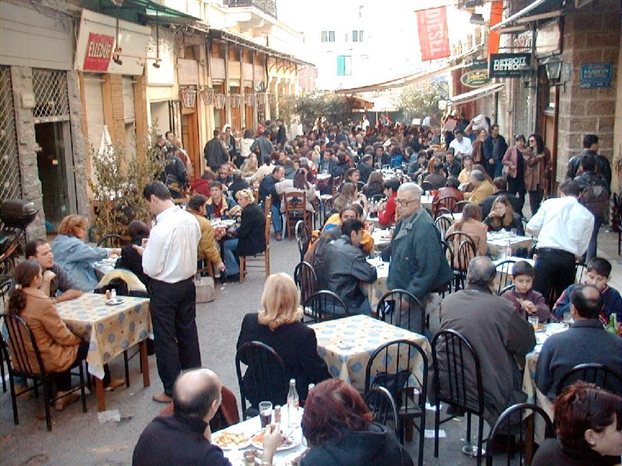The Business Provides Work for the Jobless And an Affordable Taste of Happier Times
Souvlaki has been a mainstay in Greek cuisine since ancient times. Now, after years of financial crisis, the grilled-meat dish is one of the few growth segments left in the economy.
By Stelios Bouras, Wall Street Journal
ATHENS—For out-of-work Greek advertising executive Giorgos Fragioudakis, the writing was on the wall. His company had failed in Greece’s economic crisis and he was out of a job.
So, with no income and with a family to support, Mr. Fragioudakis this year changed professions and tapped into one of the few growth segments left in the Greek economy: He became a chef.
Business is booming. And the fancy fast-food place he opened just a few months ago with two partners is now close to breaking even, he says. While admittedly a newcomer to the art of serving up grilled meat on a stick, Mr. Fragioudakis says there is a lot of crossover between advertising and selling fast food.
“I admit to being clueless about souvlaki; I learn day by day,” he said. “But the organization you need to be able to complete an advertising project is unbelievable, and those skills are needed in this business.”
What the hot dog is to New Yorkers, souvlaki—grilled meat sometimes also known as gyros or kebabs—is to Athenians. The quintessential Greek snack, it has been a mainstay in the country’s cuisine since ancient times.
Homer refers to souvlaki in the Iliad and the Odyssey. So does Aristotle in his writings, while there are archaeological finds suggesting that the fast-food souvlaki stand may have been doing business as long as 3,500 years ago.
Lately, there has been a souvlaki renaissance sweeping Greece. Although official data are hard to come by, hundreds of new souvlaki joints have opened in the past few years—even as international chains like McDonald’s have been closing stores.
But the newfound popularity of souvlaki, some say, extends deep into the Greek psyche. The trend has become a cultural phenomenon, inspiring popular music, merchandise ranging from T-shirts to pet toys. There is even a children’s board game—Souvlaki Wars—where players take turns role-playing restaurateurs in the cutthroat souvlaki-delivery business.
There is a souvlaki lover’s page on Facebook (with more than 15,000 “likes”). A national online delivery site that hooks up hungry diners with souvlaki vendors has been growing rapidly. Thelosouvlaki.gr (translation: “I want souvlaki”) now boasts a catalog of 2,177 souvlaki stands in nearly 200 towns across Greece and Cyprus—and allows viewers to rank their neighborhood grills on a five-star scale.
Avant-garde chefs have taken to spicing up age-old recipes. In place of traditional meats like pork and chicken, souvlaki with everything from shrimp to swordfish to bacon is now available. Some purveyors are now also offering rye- or corn-flour pitas to replace the usual wheat-flour flat bread that accompanies most dishes.
What explains the souvlaki craze? Some say it is a newfound consumer patriotism—brought on by the country’s economic crisis—as Greeks rediscover their favorite Greek food and turn up their noses at foreign food fads like hamburgers and sushi.
Others say it is a function of economics: Souvlaki is the ultimate cheap eat, generally costing €2 ($2.70) or less. Still others say that souvlaki, often served with tomatoes, french fries, onions and a yogurt dip known as , is the ideal fast food.
What is clear is that young and old, and rich and poor Greeks are plumping for souvlaki these days and, despite the economic crisis, continuing to enjoy eating out with friends. As a result, Greeks ranging from former booksellers to the unemployed are now trying to cash in on Greeks’ need to socialize over food, even when they don’t have much money to spend.
“For Greeks, there is no crisis when it comes to food,” says Mr. Fragioudakis. “Greeks have an erotic relationship with food. A Greek may not be able to do much due to the crisis, but he will eat out.”
Greek punk rock band Mpliax 166 captures that spirit in a recent song titled “Souvlaki With Pita” that features the headbanging refrain: “Tzatziki. Potato. Onion. Tomato.” The group sings:
“Little pudgy girl, are you hungry again?
And you want to find something simple to eat?
Something warm, that’s also cheap,
Made in a minute, and very quick?
But what can you find that’s cheap in our era?
Now in this crisis, with the euro?
But is still a relative bargain?
And to foreigners is very well known?
What is it? Tell me what it is?
Souvlaki with pita, with pita, with pita!”
But not everyone is happy about the sudden proliferation of souvlaki stands. Retailers in Athens’s upscale northern suburb of Kifissia sniff at the recent invasion of greasy spoon operations, saying they are tarnishing the luster of the neighborhood.
Earlier this year when luxury retailer Louis Vuitton announced that it was shutting down its store in Kifissia, fellow shopkeepers and local media blamed it on the steady proliferation of souvlaki joints. (Louis Vuitton denies that and says the move was part of its restructuring plans.)
Meanwhile, in his own middle class-neighborhood in southeast Athens, Mr. Fragioudakis says it is tough to do business. Since opening his shop in April, he has had to deal with a steady parade of inspectors: from the labor ministry, the police, the national pension fund, health ministry and fire department.
At the same time, old-timers are shaking their heads about the influx of new souvlaki joints, saying that the newcomers don’t know a thing about the business and they are just in it for a quick buck.
Spyros Bairaktaris, whose 134-year-old family-owned restaurant lies at the foot of the Acropolis, blames Greece’s dismal work prospects for the souvlaki rage.
“These new business people want to get rich quick. They should aim at building their business bit by bit; it is not that easy,” said Mr. Bairaktaris. “Most of these ventures won’t end well.”









